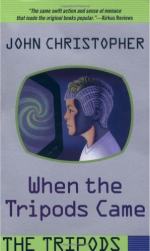|
This section contains 634 words (approx. 2 pages at 400 words per page) |

|
When the Tripods Came Summary & Study Guide Description
When the Tripods Came Summary & Study Guide includes comprehensive information and analysis to help you understand the book. This study guide contains the following sections:
This detailed literature summary also contains Topics for Discussion and a Free Quiz on When the Tripods Came by John Christopher.
This novel for young adults is the first in a series of books about the Tripods, mechanical entities eventually revealed to be the means by which an alien race (known as the Masters) takes control of humanity. "When the Tripods Came" tells the story of how the Tripods first come to Earth and establish control, and in doing so explores themes relating to the occasional necessity of breaking rules, loyalty and the importance and value of free thought.
The narrative, recounted from the first person perspective of mid-teen protagonist Laurie (short for Laurence), begins with Laurie and his friend Andy witnessing the attack of a tall, mechanical, three-legged vehicle (referred to as a Tripod) on a nearby farmhouse. The boys watch as the Tripod destroys the house but is itself destroyed by military forces.
A few months later, Laurie has become a celebrity at school (for having witnessed the events at the farmhouse) while Tripods (which also land in America and Russia, and are destroyed there as well) have become figures of fun, becoming the lead characters in what Laurie describes as a silly but somehow disturbing television program. As time passes, more and more people become obsessively addicted to the program, coming to regard the Tripods as heroes. When a second wave of Tripods lands on Earth, they are greeted by the so-called "Trippies" and hailed as saviors. Meanwhile, Laurie describes (in narration) his complicated relationship with his father (Pa) whom he resents for, as Laurie sees it, devoting too much time and energy to his second wife and their daughter.
Over time, Laurie and his family watch with increasing concern as more and more people go over to the Tripods' cause, becoming fearful for their own safety when those who do not do so voluntarily are forced into specialized helmets, or Caps, that orient the wearer's mind to unquestioning faith in the Tripods' compassion and power. After Laurie narrowly escapes an attempt by his uncle and cousin to force him into a Cap, he and his family attempt to escape to what they believe will be freedom on the isolated island of Guernsey. There, however, they are dismayed to discover that the influence of the Tripods has arrived there first and make plans to escape to the only place in Europe which, to this point, has remained free of Tripod influence—Switzerland, the home country of Pa's second wife.
The stay of Laurie and his family in Switzerland is, at first, peaceful (in spite of Laurie's continued resentment of his father's second family) and safe. Eventually, however, the Tripods assert control there as well. When Andy is captured and in imminent danger of being Capped, Laurie attempts a rescue but is himself captured. He and Andy are both eventually freed by Pa, who then leads the entire group (now consisting of Laurie, Andy, other family members, and a few Swiss refugees from Tripod control) into a hidden valley, where they are safe for a while. Laurie begins to develop a new perspective on his father and their relationship.
After a long winter, the group becomes aware that a Tripod is making regular patrols of the area. Laurie suggests that they trigger an avalanche in order to destroy it, but other members of the group object, saying an attempt (either successful or failed) risks drawing the attention of other Tripods. Eventually, Pa asserts leadership and leads the attack, which successfully buries the Tripod in piles of snow. Although two other Tripods eventually visit the scene and destroy the remains of the sabotaged Tripod, no further patrols are established.
The novel concludes with Laurie (now enjoying a closer relationship than ever with Pa) declaring in narration that the fight for free thought must go on, for centuries if necessary.
Read more from the Study Guide
|
This section contains 634 words (approx. 2 pages at 400 words per page) |

|



